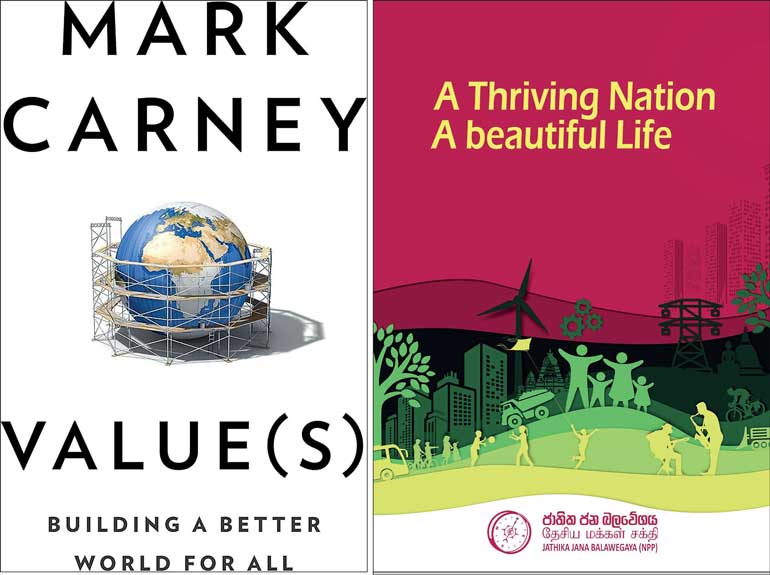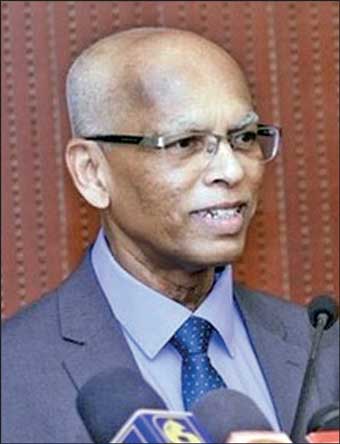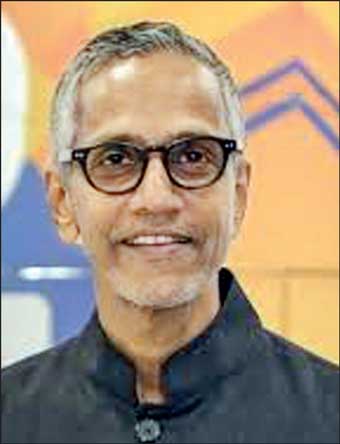Monday Feb 23, 2026
Monday Feb 23, 2026
Wednesday, 15 January 2025 00:24 - - {{hitsCtrl.values.hits}}

 Mark Carney, the changed monetarist
Mark Carney, the changed monetarist
In the open forum time at the launch of ex-central banker Dr. H.N. Thenuwara’s new book, Economic Policy Lessons For A New Sri Lanka, last week, social activist cum actor Peter de Almeida raised an important issue relating to the values associated with markets.
Thenuwara had emphasised in his speech that to uplift the standards of the people, the governments should create, promote, stabilise, regulate, and legitimise markets. This implied that having proper markets is fundamental to attaining economic prosperity. De Almeida who disagreed with these market sentiments, quoting Mark Carney, an ex-Governor of both the Bank of Canada and Bank of England, from his 2021 book Value(s): Building a Better World for All1, argued that what is needed is not a society based on market values but on human values.
The crux of the argument of Carney, a career central banker who had guided both central banks he had headed through a policy agenda based on monetarism that believed in markets, was that the so-called ‘market economies’ have evolved into ‘market societies’ in which the value of everything is determined not by the usefulness but by the price that is determined in the market. The prices do not reckon what the humanity values most highly, namely, fairness, health, protection of rights, economic security from poverty, preservation of nature’s diversity, resources, and beauty. These values go into the backwater when prices are determined by the interaction of the demand and the supply which are increasingly manipulated by market agents guided by their own self-interest. As a result, those values dearest to humanity become casualties rather than cherished gains.
For instance, we may care for climate change and its destructive impact on the world today as well as the future. But when we drive our car with a positive carbon footprint at every stage of production and emits greenhouse gases freely to the environment when we drive it, we do not regard that factor. Instead, at production level, it is the prices of inputs determined in the markets, and, at the use level, it is the price of the car and its fuel and maintenance costs that we regard. Since accounts are kept without incorporating these costs, known as green costs, the prices are determined independently of them. Hence, prices reflect only our personal wishes and not the humanity’s desires.
This is only one example and there are many more.
So, Carney’s attempt has been to suggest a practical manifesto for the world to reach a more humane society. Therefore, the goal of every policy being considered should be to promote human values which people cherish most. If the world fails in this enterprise, it fails the mankind too. Carney has further elaborated on these points in a four-part Reith Lecture series hosted by BBC Radio 4 in honour of its first Director General, Sir John Reith2. Encouraged by the public acceptance he has received, Carney is planning to issue an addendum to his thesis in a forthcoming book in May 2025 under the title The Hinge: Time to Build an Even Better Canada. The title has been taken from a quotation of Winston Churchill in 1941 in Ottawa that the world was at a hinge moment at that time in history threatening the world’s wish for freedom and prosperity3.
More economists questioning validity and purpose of markets
 |
| Dr. H.N. Thenuwara |
 |
| Peter D’Almeida |
Carney has not been alone in criticising or expressing dissatisfaction about the performance of markets or market agents on the supply side, namely, producers or traders. About 2,400 years ago, Kautilya, the Indian Guru of economics in his treatise titled The Arthashastra, said that ‘merchants are thieves in effect if not in name; hence, they should not be permitted to oppress the people’4. Adam Smith, father of modern economics, observed in his treatise, The Wealth of Nations, that when traders of same commodity met socially, the discussion invariably zeroed on a conspiracy against the public on how to increase prices5. The American economist and sociologist Thorstein Veblen highlighted the emptiness of capitalist philosophy by offering a theory of the leisure class in which the consumption of luxury goods was limited to this high social class leaving all those people who have contributed to produce them out6.
The most influential economist in the 20th century, John Maynard Keynes, did not have kind words for the free-market economies guided by the then popular laissez faire economic doctrine and suggested that the government intervention was needed to drive economies out of economic recessions. Keynes has said that the self-interest of market agents always does not coincide with the social interest of citizens. The problem with those who cherish self-interest, according to Keynes, is that they are not enlightened on one side, and they are too ignorant or too weak to attain them, when they pursue it separately, on the other7.
Canadian American economist and diplomat John Kenneth Galbraith summed up the work of capitalist enterprises as creators of artificial wants through advertising and other immoral means that invariably led to the misallocation of scarce resources through the market system8. The Italian economist now attached to University College London, Mariana Muzzucato has delivered a serious blow to the free-market economy system by claiming that in a market economy it is too easy for those operating there to get rich by extracting value from those who actually create it, and not by adding it themselves leaving the question what creates value unanswered9.
Joseph Stiglitz, Nobel Laureate in economics and rebel in the mainstream economics family, in his 2024 book, The Road to Freedom: Economics and the Good Society, has argued that free and unfettered markets have only succeeded in delivering a host of global crises. They span from financial crises to opioid crises to global as well as domestic inequality crises10.
Therefore, it is customary for leading economists to question the validity and purpose of the free-market economy system. Mark Carney’s scathing attack on the market economy, despite his monetarist upbringing, is in line with this tradition.
Positive and normative sides of economic analysis
In my view, this divergent opinion about the role of markets in the economy between critics and advocates is due to the difference in approach to economic analysis, namely, positive and normative.
The positive economists just examine the markets as they are without expressing an opinion about the moral and ethical sides of the markets. For instance, when prices are determined in the market, it just looks at the mechanism without going into its background or how those prices will change the welfare distribution of those who are forced to accept them.
In contrast, the normative side of economic analysis seeks to look at the issues involving how economies should be organised to deliver results that will be compatible with the expectations of the people. Carney’s list of those desires which are close to the heart of people comes within the purview of the normative side of economics. Understandably, it is this list which is canvassed by politicians with voters at the elections, no matter whether it is developed countries or their poor counterparts. This feature is observable in all the election manifestoes put forward by politicians seeking political office.
AKD’s promise of an expanded Government sector
The election manifesto presented by President Anura Kumara Dissanayake, known as AKD, at the last Presidential Election in Sri Lanka titled A Thriving Economy – A Beautiful Life contains this wish list in every promise which he has made to the voters11.
Advocating for bringing out a renaissance, it calls for a massive social transformation not confined to adopting the usual patchwork reforms introduced by previous Governments. What are the areas where reforms are necessary to usher this renaissance-led era? The list is exactly what Carney and others have advocated: engineering, health, education, art, literature, human rights, good governance, and so on. These are the dreams of people close to their hearts as canvassed by Carney. According to this manifesto, education, health, and transportation should be delivered not by the private sector but as essential public services.
It is a different type of a market, ruled by the Government and not by the private individuals. In line with this policy, more public funds will be allocated to produce and supply these services to the people in this Government-led market system. In other words, instead of using private initiatives and private investments, it will be an economic system in which the funds are raised by the government via taxation and allocated for production processes.
Carney and others have argued that the market system that depends on the private initiatives for producing the needed goods and services is defective in the sense that it helps those with power, money, information, and market networks to extract a greater portion of the end-output for themselves. But when it is done by the Government which makes decisions by having the dreams and interests of people close to hearts, this extraction process, a kind of private corruption, could be put to an end. What about the Government sector corruption? AKD has planned to put that too to an end through an effective corruption fighting mechanism led by the observance of the rule of law that applies equally to Government members as well as to the private citizens. His Clean Sri Lanka project aims at creating this attitudinal change among the people.
Quick conversion to neoliberalism via IMF
But AKD is now in a dilemma after he has accepted to go along with the reform program proposed by IMF in its extended fund facility, known as EFF, and the foreign debt restructuring plan associated with it and the domestic debt restructuring already undertaken to please a section of the International Sovereign Bond or ISB holders.
In the manifesto, AKD had promised to renegotiate the IMF’s EFF and its debt sustainability analysis or DSA parameters to free the poor and deprived people from the ‘painful conditions’12. This promise was one of the contesting elements by one of the rivals in the presidential race, namely the former President Ranil Wickremesinghe, known as RW. He had warned the electorate that if he was not returned to power and if AKD is elected, the country will descend to the calamitous state that prevailed in the country prior to 202213. The reference here was the need for continuing with the ongoing IMF program and if it is abandoned, Sri Lanka would lose credibility among the international community and lose all the support it was receiving from them to get out of the deep economic crisis.
AKD had to make a quick decision when he was elected to presidency and as a pragmatic statesman, he chose for the continuation with the IMF program and the associated debt restructuring plan14. But by accepting this stance, he shed his anti-neoliberal stand and became converted to that policy ideology which was the foundation of the IMF’s reform program. In a previous article in this series, I have compared the neoliberal policy principles and the benchmarks insisted by IMF in its EFF15. This program does not believe in the expansion of the Government sector, canvasses for a rejuvenated market mechanism, and wants Sri Lanka Government to bring forth stability via the private sector led markets.
Continuation with IMF program has helped AKD to avoid an economic calamity, the worst fears expressed by RW. In addition, it has become an unearned bonus for him because that program will strengthen the Government coffers through high taxation and enlist support from participating global friends like India and China from this part of the world and from the Western economic bloc from the other side. The improved revenue which is estimated to be a record Rs. 4 trillion in 2024 and much more than that in 2025 will provide a comfortable fiscal space to AKD to expand the Government sector, while maintaining the benchmarks fixed by IMF under its EFF.
But the planned outlays by the Government under AKD’s Government sector expansion program should not be wasted, and the necessary checks and balances should be introduced to ensure that they are really used for ushering a new era characterised by a thriving nation and a beautiful life for the people.
AKD’s dilemma
Thus, AKD’s dilemma is how to please his electoral supporters in one extreme and IMF and its advocates at the other at the same time. This requires competence in ingenuity in policy panning.
This is a tall order, and he should balance every action of his Government just like an acrobat walking a tightrope.
Footnotes:
1Carney, Mark, 2021, Value(s): Building a Better World for All, A Signal Book.
2Available at the link following the first lecture accessible at: https://youtu.be/uvw-aC0KLD4?si=VF8Ns7rUWY0F53YR
3See: https://www.theglobeandmail.com/business/article-mark-carney-to-release-book-the-hinge-a-look-at-canadas-path-forward/
4The Arthashastra, L N Rangarajan translation, 1987, Penguin, p 86.
5Smith, Adam, 1776, The Wealth of Nations, Bantam Classic Edition, 2003, p 177.
6Veblen, Thorstein, 1925, The Theory of Leisure Class, Unwin, London.
7Cited by Wapshott, Nicholas, 2011. Keynes-Hayek: The Clash that Defined Modern Economics, W W Norton, New York, p 36.
8Galbraith, J.K, 1958, The Affluent Society, Houghton Mifflin Harcourt (1998 reprint).
9Muzzucato, Mariana, 2017, The Value of Everything: Making and Taking in the Global Economy, Penguin.
10Stiglitz, Joseph E, 2024, The Road to Freedom: Economics and the Good Society, Allen Lane.
11Available at: https://www.npp.lk/up/policies/en/npppolicystatement.pdf
12Ibid, p 59.
13https://www.sundaytimes.lk/240915/news/i-want-to-ask-sri-lanka-to-think-of-your-future-and-vote-for-the-future-ranil-571480.html
14https://pmd.gov.lk/news/president-dissanayake-reaffirms-commitment-to-imf-objectives-advocates-for-alternative-solutions-to-ease-the-burden-on-people/
15https://pmd.gov.lk/news/president-dissanayake-reaffirms-commitment-to-imf-objectives-advocates-for-alternative-solutions-to-ease-the-burden-on-people/
(The writer, a former Deputy Governor of the Central Bank of Sri Lanka, can be reached at [email protected].)